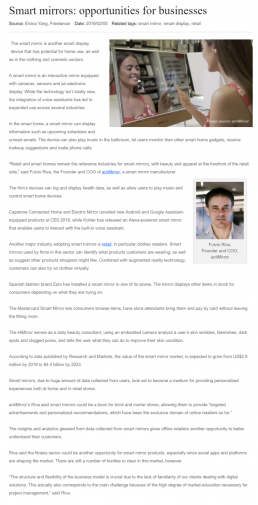February 15th, 2019
Smart mirrors: opportunities for businesses
The smart mirror is another smart display device that has potential for home use, as well as in the clothing and cosmetic sectors.
A smart mirror is an interactive mirror equipped with cameras, sensors and an electronic display. While the technology isn’t totally new, the integration of voice assistants has led to expanded use across several industries.
In the smart home, a smart mirror can display information such as upcoming schedules and unread emails. The device can also play music in the bathroom, let users monitor their other smart home gadgets, receive makeup suggestions and make phone calls.
“Retail and smart homes remain the reference industries for smart mirrors, with beauty and apparel at the forefront of the retail side,” said Fulvio Riva, the Founder and COO of actiMirror, a smart mirror manufacturer.
The firm’s devices can log and display health data, as well as allow users to play music and control smart home devices.
Capstone Connected Home and Electric Mirror unveiled new Android and Google Assistant-equipped products at CES 2019, while Kohler has released an Alexa-powered smart mirror that enables users to interact with the built-in voice assistant.
Another major industry adopting smart mirrors is retail; in particular clothes retailers. Smart mirrors used by firms in this sector can identify what products customers are wearing, as well as suggest other products shoppers might like. Combined with augmented reality technology, customers can also try on clothes virtually.
Spanish fashion brand Zara has installed a smart mirror in one of its stores. The mirror displays other items in stock for consumers depending on what they are trying on.
The Mastercard Smart Mirror lets consumers browse items, have store attendants bring them and pay by card without leaving the fitting room.
The HiMirror serves as a daily beauty consultant, using an embedded camera analyze a user’s skin wrinkles, blemishes, dark spots and clogged pores, and tells the user what they can do to improve their skin condition.
According to data published by Research and Markets, the value of the smart mirror market, is expected to grow from US$2.8 million by 2018 to $4.4 billion by 2023.
Smart mirrors, due to huge amount of data collected from users, look set to become a medium for providing personalized experiences both at home and in retail stores.
actiMirror’s Riva said smart mirrors could be a boon for brick and mortar stores, allowing them to provide “targeted advertisements and personalized recommendations, which have been the exclusive domain of online retailers so far.”
The insights and analytics gleaned from data collected from smart mirrors gives offline retailers another opportunity to better understand their customers.
Riva said the fitness sector could be another opportunity for smart mirror products, especially since social apps and platforms are shaping the market. There are still a number of hurdles to clear in this market, however.
“The structure and flexibility of the business model is crucial due to the lack of familiarity of our clients dealing with digital solutions. This actually also corresponds to the main challenge because of the high degree of market education necessary for project management,” said Riva.

